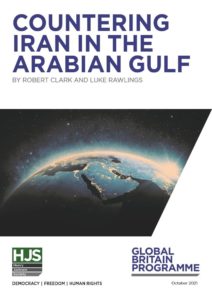 A proposed U-turn on the Government’s Iran policy being studied by Ministers would result in a “material likelihood” of British nationals being killed in a terrorist attack.
A proposed U-turn on the Government’s Iran policy being studied by Ministers would result in a “material likelihood” of British nationals being killed in a terrorist attack.
British negotiators have resumed talks in Vienna this week, to secure a new deal with Iran over its nuclear and regional aggression. Reports have suggested the British Government is considering backing a straightforward return to the conditions of the JCPOA, first agreed by the Obama administration in 2015.
The deal lifted sanctions on Iran in exchange for temporary restrictions on its nuclear development. However, the agreement was criticised by Gulf, Israeli and later American officials for placing no binding restrictions on Iran’s regional sponsorship of terrorists or development of ballistic missile technology, and no permanent shut down of Iran’s nuclear programme. The deal largely collapsed in 2018 after the Trump administration withdrew and resumed sanctions. In 2019, Iran resumed nuclear enrichment of Uranium above 3.67%.
The Integrated Review – unveiled by Boris Johnson in March – committed the UK to support of a “more comprehensive nuclear and regional deal”. Reports suggested such a deal would insert legally binding requirements on Iran to cease sponsorship of terrorist groups including Hezbollah and Houthis, in exchange for sanctions relief.
Countering Iran in the Arabian Gulf identifies 186 separate occasions on which Iranian-funded terrorist groups attacked the UK or its allies since 2016. Targets have included both Saudi Arabia and coalition forces in Iraq (including operations staffed by British personnel).
Separately, the paper identified 54 separate breaches of UN Security Council Resolution 2231 which prohibits Iran from involvement in arms dealing. These have included Iranian-made anti-tank guided missiles being smuggled as far as Libya and the seizure last year by Australian officials of “approximately 476,000 rounds of 7.62mm ammunition, and 697 bags of chemical fertiliser”.
In a foreword attached to the report, Chairman of the House of Commons Defence Committee, Tobias Ellwood MP, called on the Government to invite Saudi Arabia and the UAE to join the negotiating process. He said such a move “could help reduce long-term tensions, which would not just be mutually beneficial but would allow the entire region to prosper”.
Elwood also criticised reductions in the size of the UK’s surface fleet which he argued “risks destabilising the International Maritime Security Construct if it is not replaced with another permanent deployment”. He endorses a recommendation within the report to “fully operationalise the ‘permanent deployment’ of a type 23 Frigate to Operation Kipion, based in Bahrain”.
The report’s author, Robert Clark, defence policy associate at the Henry Jackson Society, commented:
“The British Government were very clear that there could be no return for a nuclear-only deal, which would see Iran’s arms-length terrorist campaign against our allies and us continue. The urge to secure a deal is understandable. However, u-turning on this point leaves a material likelihood of groups funded by Iran killing British nationals during their continued campaign of terror.
“Boris Johnson promised the Integrated Review was a once-in-a-generation redrawing of our overseas policy. Reneging on his policy now in a misguided attempt to bring the Ayatollahs to the table would be an act of unconscionable weakness.”
Executive Director Dr Alan Mendoza said:
“As the UK knows from our own recent negotiating experience, a bad deal with Iran would be far worse than no deal. If we truly want to reduce tensions in the Middle East rather than just kicking the can down the road for the next few years, we must ensure Iranian compliance with basic norms of international behaviour.”


